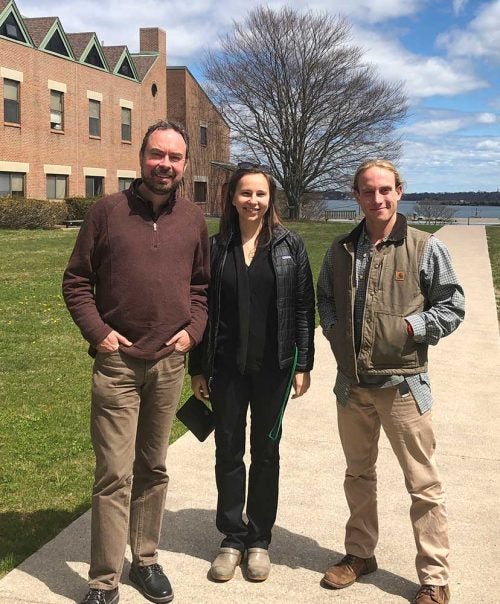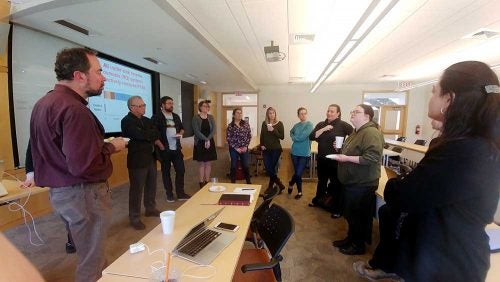 Event
Event
Spring Colloquium on PFAS
The Training Core, led by Bongsup Cho, organized STEEP’s first semester-long PFAS Colloquium at the University of Rhode Island from February through May 2018. The main objective of the PFAS Colloquium was to provide our trainees unique opportunities to explore all aspects of PFAS in one course sequence. The Colloquium focused on sharing knowledge and research on topics related to PFAS, ranging from physiochemical properties and direct detection and remediation, and other scientific findings, to communicating science to affected communities, social justice, and policy. Speakers included STEEP scientists, Core leaders, and invited guests. The “kickoff” meeting on February 14 with Dr. Philippe Grandjean sparked a lively discussion as to how scientific findings are presented to the public, how the information is received, and what could be done to improve the flow and comprehension of such material, especially when it concerns the health of a community. All lectures were broadcast live via WebEx. See the Spring 2018 PFAS colloquium schedule for the list of lectures and lecturers.
In addition, the STEEP Colloquium hosted the following two guest speakers from other universities and SRP programs:

Dr. Jennifer Guelfo, Postdoctoral Research Associate, State Agencies Liaison, Superfund Research Program, Brown University
Dr. Guelfo presented her research on “Strategies for Contaminant Mixture Evaluation: Lessons Learned from Per- and Polyfluoroalkyl Substances.” Analysis of a nationwide drinking water database illustrates that PFAS occurrence in mixtures will be prevalent in systems where impacts are present. PFAS fate and transport studies show that kinetic effects apply to sorption in batch and column systems, which may cause large, disperse plumes of a subset of recalcitrant PFAS. This may be exacerbated by transformation patterns of additional, labile PFAS into recalcitrant endpoints, as illustrated by studies of biosolids-amended soils. Current environmental management and mitigation strategies target contaminants for which in-depth studies (e.g. fate, treatment, toxicology) are available. However, the number of relevant compounds, mixture occurrence, and complex behavior in environmental and treatment systems limit application of this approach to PFAS, and prioritization methods are needed to identify compounds and mixtures for further study. Tiered evaluations that start by understanding which PFAS occur in the environment, next evaluate the persistence of PFAS that occur, and then assess the treatability of the most persistent PFAS, can identify and prioritize which compounds represent the highest risk of exposure (i.e. those that occur, are persistent, and resistant to treatment). Strategies developed for PFAS could also be expanded and applied to the broader suite of unregulated contaminants present in the environment. Working to understand environmental behavior and reduce exposure to prioritized groups of PFAS or other unregulated compounds will accelerate efforts to mitigate potential impacts to human or environmental health.
Dr. Detlef R. U. Knappe, Professor of Civil, Construction, and Environmental Engineering, North Carolina State University

Dr. Knappe presented on the “Impacts of Fluorochemical Production and use on Drinking Water Quality in North Carolina.” Because of their persistence, bioaccumulation potential and (eco)toxicity, long-chain perfluoroalkyl substances (PFAS) are being replaced with short-chain PFAS and fluorinated alternatives. Perfluoroalkyl ether carboxylic acids (PFECAs) are one important class of fluorinated alternatives. However, almost no information exists about the occurrence of PFECAs and their behaviors during drinking water treatment. Dr. Knappe presented his results on levels of PFAS, PFECA, and PFECA GenX in the Cape Fear watershed and its implications on drinking water policy, after spending the day with STEEP faculty and trainees. The STEEP seminar was co-hosted by Rhode Island INBRE (IDeA Network for Excellence in Biomedical Research) and ESPCoR (Experimental Program to Stimulate Competitive Research) programs.


